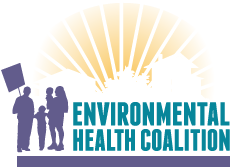
On Sunday morning July 12, a 3-alarm fire broke out aboard the Navy ship USS Bonhomme Richard docked at Naval Station San Diego, located between Barrio Logan and National City. Environmental Health Coalition (EHC) expresses our heartfelt thoughts and prayers to the Navy personnel who were injured and our gratitude to the firefighters and emergency personnel who responded to the immediate threat.
Unfortunately, the protection of public health in the neighboring communities was not a high priority for officials. National City residents report being overwhelmed by the odors in the early afternoon and throughout the day. Many said that they had to leave their homes because of the fumes and because they didn’t have air conditioning that would have enabled them to stay inside with the windows closed because of the heat.
EHC is deeply concerned and outraged that the San Diego County Air Pollution Control District (APCD) and Health Department were under-prepared to protect public health during a crisis like this. National City Mayor Alejandra Sotelo-Solis’ statement in English and Spanish warning the public and advising them to stay indoors came at 2:30 PM and was the only statement from an official source for hours.
The Navy spokesperson, Rear Admiral Phillip Sobeck’s assertions that the smoke does not contain toxics is preposterous and inaccurate. Smoke inhalation is hazardous to everyone’s health, especially those who have chronic conditions like respiratory illness or heart disease.
EHC calls for the following actions:
- The County should immediately update their guidance on social media to effectively warn the public, and especially those with chronic conditions and provide safety information.
- The County should provide emergency shelter for impacted residents that is cool, smoke-free and COVID-safe
- The APCD should release air monitoring results immediately
- The County should develop an emergency monitoring plan in collaboration with the community to implement as soon as a disaster like this occurs.
- The Navy should release its findings regarding the cause and source of the fire as soon as that information becomes available.
The community deserves to have complete information about the toxins in the fire and how those could harm their health. National City and Barrio Logan are low-income communities of color that already have compromised air quality and are in the top 10% of most polluted neighborhoods in the state. As a result, 3-5 times more children in these communities suffer from asthma and other respiratory illnesses.
Related News Coverage:
- Smoke from burning Navy ship in San Diego triggers health concerns, pollution monitoring (SDUT)
- Combaten incendio en el buque USS Bonhomme Richard por segundo día (Noticiasya)
- Answers on Navy Fire’s Health Impacts Won’t Come Right Away (VOSD)
- Air Quality Concerns Surround USS Bonhomme Richard Fire (KPBS)
Image credit: Port of San Diego Harbor Police via Twitter




